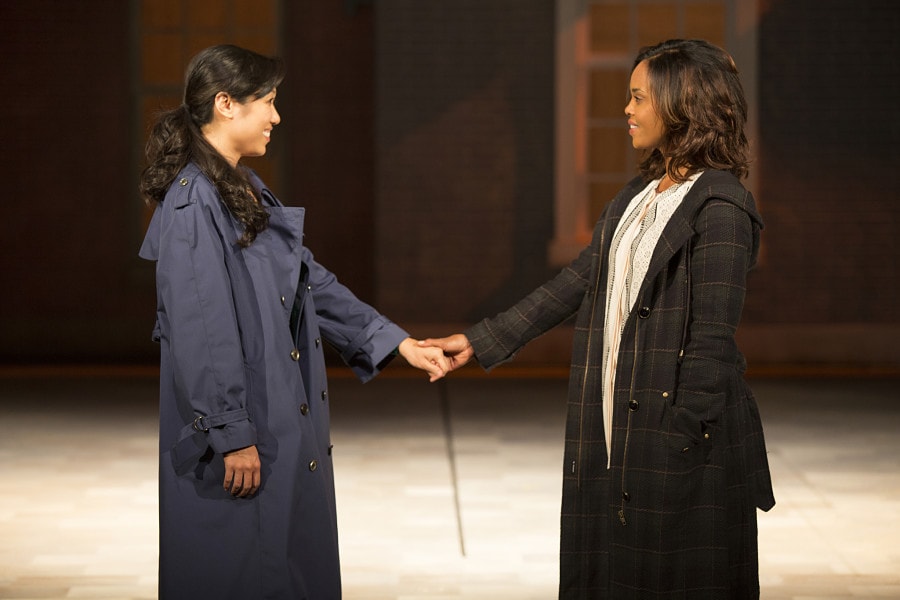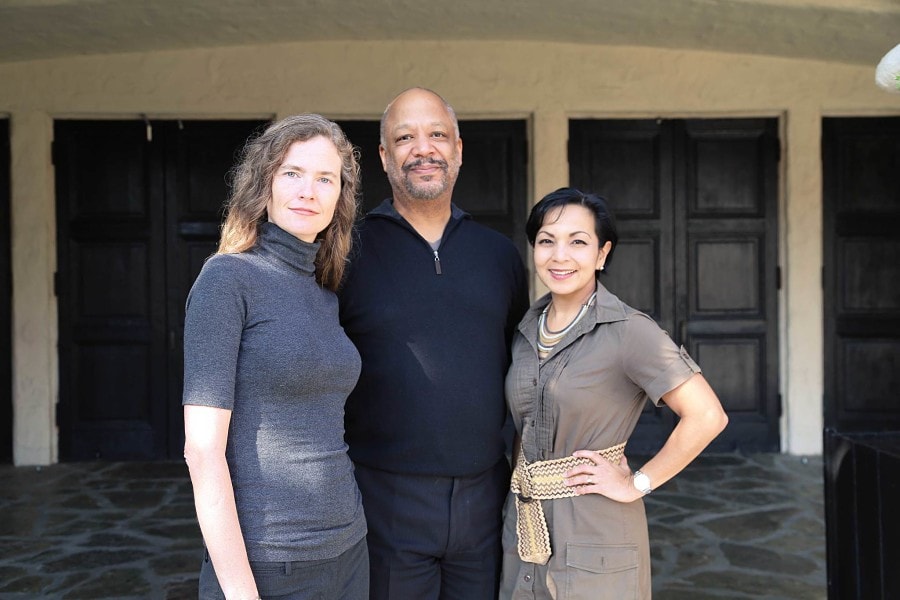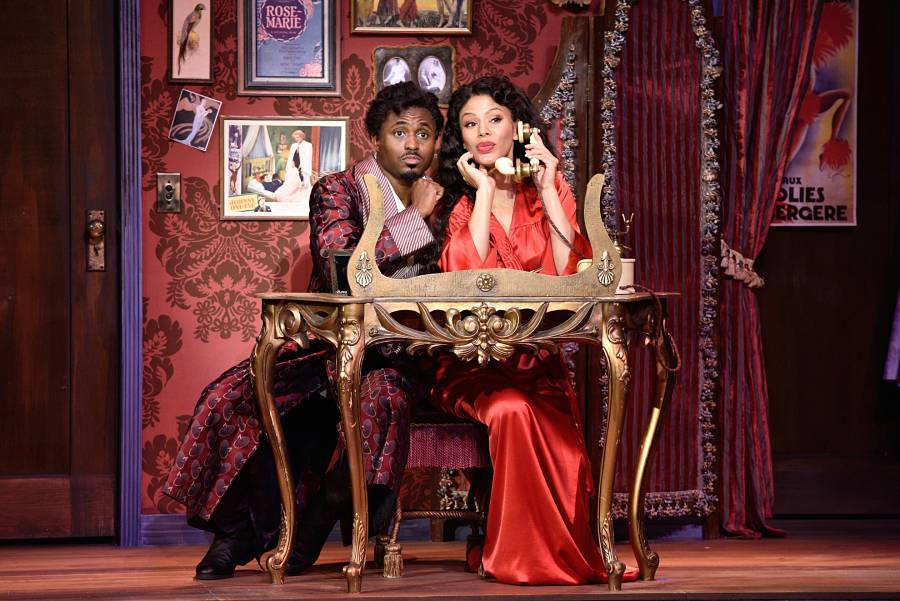When Sheldon Epps first arrived as artistic director at the Pasadena Playhouse in the 1990s, he would sit in the courtyard and view people milling about before a show.
“I would be the only person under 60 and the only person of any color,” Epps recalls. “It frightened me on a business level, because I saw the audience for this theatre literally going away. It seemed to me that this theatre was in a vibrant, highly diversified community, and the audience I was seeing—and also the plays that were being done—were not reflective of the rich cultural diversity of this theatre’s community.”
Today, 18 years later, Epps’s 647-seat theatre is comparatively rich with that diversity, not only in its audience and on its stage but on its board and staff as well. But that isn’t enough. To further broaden his mission, Epps brought in Seema Sueko last January as his associate artistic director.
Sueko, 41, came to the Playhouse from Mo’olelo Performing Arts Company, a 107-seat Equity theatre she founded in San Diego in 2004. While there, she pioneered a methodology called “consensus organizing for theatre,” which she has since refined and brought to her new job in Pasadena. Derived from community organizer Mike Eichler’s principles of consensus organizing for civic environments, consensus organizing for theatre is an artistic process that involves building stakes in multiple pockets of communities—and encouraging those communities to return the favor, whether that means getting involved in the theatre’s overall programming or in a particular production.
The goal is to forge long-term relationships that translate into ticket sales, educational opportunities, audience building, board development, new donor and funding opportunities and diversification of all aspects of the theatre. Partners in this process gain visibility, an opportunity to share their own missions, and a deep connection to the theatre and the broader community.
Pasadena Playhouse is not alone in employing this kind of community-based audience-building. Sojourn Theatre in Portland, Ore., Mixed Blood Theatre in Minneapolis and Cornerstone Theater in Los Angeles are just a few stages that have adopted similar initiatives to build audiences and make their work more responsive to them. Sueko’s consensus organizing, however, differs from more traditional community outreach and targeted marketing, largely in its technique, scope and breadth.
“A mutual stake is built by surfacing mutual self-interests,” Sueko explains. “The theatre knows what its self-interests are, and it initiates mindful conversations with community members and businesses to bring their self-interests to the fore. Where things align, that’s where the organizing happens—we organize around that.”
To demonstrate its commitment to the process, the Playhouse hired four independent contractors as consensus organizers, assigned to specific productions. Funding for the hires came from grants and staff realignment. “You can’t simply think about diversifying a theatre, diversifying your audience, and will it into happening,” Epps reasons. “You’ve got to have people on the ground who make it happen.”
Sueko reached out to the local arts community to find her team, which consists of Peter J. Harris, Alison De La Cruz, Victor Vazquez and Nijeul X. Porter.
“My first step was realizing that I did not have the expertise with L.A.,” she says. “These community organizers are themselves artists, and they have lived in L.A. much longer than I have. Most of them self-identify as cultural workers; they’re social-justice motivated. So they straddle the worlds of art and community seamlessly.”
Sueko’s methodology begins when a theatre selects a work to present on the stage. “It all starts with the artistic need,” Sueko says. “Everything comes from a dramaturgical place.”
From there, the consensus organizer begins conducting research and brainstorming potential community partners. The list they gather can be broad, but is always targeted to specific aspects of the production, whether that be experts to consult on scenes in the play, donors for sponsorship, panelists for audience talkbacks or simply groups interested in the topic of the show. Consensus organizers reach out via e-mail, phone calls or face-to-face visits.
To help familiarize organizers with the shows and to embrace nonartistic staff in the earliest stages of productions, the Playhouse’s creative teams have begun taking the unusual step of opening up portions of rehearsals, inviting in observers who normally would not be part of that process.
Take Sueko’s production of Stop Kiss last November. “We did an in-house read-through over the summer,” she recalls. “I did that to serve my director’s need. But it was also serving the consensus organizing need, because I felt like I needed the box office and other departments to support this play and see the play and believe in the play.”

To that end, she cast the reading with Playhouse employees: The technical director read one role, one of the major gift officers read another and a box-office staffer read another. They plan to continue this process with an upcoming Thai-themed musical, Waterfall, and other shows.
Those in-house read-throughs have proven to be an additional tool in the organizers’ belts. “I was able to sell everything—the mutual self-interest and the history stuff,” says Peter J. Harris, who worked as the organizer for the Playhouse’s earlier production of Kiss Me, Kate, featuring a largely African-American cast. “But also I could say in honesty and without any hesitation, ‘You will enjoy this show.’”
While working on the show, Harris reached out to Christopher Jimenez y West, an assistant professor of history at Pasadena City College, to participate in a post-show panel about African culture and black theatre groups. The Playhouse was able to bring in the younger audience of PCC students to the theatre, while Jimenez y West was able to share his own expertise as head of the Jackie Robinson Lecture Series at PCC and introduce more people to the work being done at the college. Both sides declared the collaboration a success.
That’s not to say there haven’t been challenges along the way. One of the biggest: price points for discounted tickets. That’s where negotiating, internally and externally, comes into play.
“We might find out that there’s a group interested in a show, and so we get a sense of what their price point is,” Sueko says. “Sometimes they’re spot-on and we’re pleasantly surprised. But sometimes the price points are far off. We each have so much at stake, although we might be fighting for different things. We’re constantly evaluating.”
The process of what Sueko calls “designing the audience” goes far beyond just selling tickets, Epps emphasizes. “It’s not just, ‘All we’re trying to do is get you in here to see the play.’ We’re trying to connect through extended programming, through conversation, through dialogues on a much deeper level than the two hours of sitting in our theatre. It’s, ‘What can we do to make you feel ownership of theatre?’”
Before coming to the Playhouse, Sueko had a chance to “scale up” her consensus organizing methodology at Arena Stage in Washington, D.C. In 2012, she was awarded one of TCG’s Leadership U[niversity] One-on-One Grants for early-career leaders, which took her to Arena to work with artistic director Molly Smith as a mentor.
“She is an absolute bright star,” Smith says, adding, “I would say that Seema is the future of the American theatre.”
Though Sueko was at Arena for less than a year, Smith says, she was able to advance audience-building efforts already in place at the theatre. “Her work is very targeted,” Smith says. “She encouraged us to look early for all of the different affinity groups that might be interested in our projects. That was different. And then reaching out to them to let them know about the project, going more deeply into bringing some of the groups in quite early. She thinks in a smart way.”
Sueko’s ties to theatre trace back to her childhood. Born in Karachi, Pakistan, to a Pakistani scientist father and a Japanese-American mother, she moved to Hawaii when she was 10 months old. There, her parents immersed her and sister Aisha in the arts: They sang in choirs, performed in local theatre and took dance classes. When it came time for college, Sueko chose the University of Puget Sound in Tacoma, Wash., and majored in political science.
She met her husband of 18 years, sportscaster Troy Hirsch, while in college. They moved to Chicago, where Sueko continued her studies in international relations with a focus on Middle East politics at the University of Chicago. The diplomatic skills Sueko picked up as a political science student would complement her work as an actress, director and later as a leader in consensus organizing efforts.
“When I got to grad school, I realized how much I valued the theatre part of my world, and wanted to do that,” she says. So after gaining her master’s degree, she decided to take part in the rich theatre opportunities the city had to offer, primarily at Circle Theatre in Oak Park, Ill. Sueko and her husband eventually moved to Spokane, Wash., then Seattle and New York before settling in San Diego. They now split time between San Diego and Pasadena.
“Good, good. Let’s do this again. From the top.”
Sueko is rehearsing a scene from Diana Son’s play Stop Kiss in a windowless space a few blocks from the Playhouse. It is her directorial debut at the theatre. Actors Angela Lin and Amanda Carlin are wrestling with a scene that takes place in a hospital room.
“Can we talk about this? I don’t know what I want here, I’m having a hard time,” Lin says.
“Tell me about your action here,” Sueko responds. “What are your character’s needs?”
The next day, Valerie Udeozor, a nurse and instructor at Pasadena City College, will work with the cast. Udeozor will advise cast members on what it’s like to care for someone in the hospital, and her class will later attend the play and do a case study on the characters in the play as a class assignment.
Sueko will put her consensus organizing methods further to the test as the Playhouse launches a new yearlong initiative called Mi Historia, Mi Manera (My Story, My Way). Funded by the James Irvine Foundation and TCG’s Audience Revolution grant, the goal of Mi Historia, Mi Manera is to increase the arts participation of Latinos in the San Gabriel Valley, just east of Los Angeles. A condition of the grant is that the Playhouse conducts its outreach away from the theatre.

The initiative consists of three main elements: a partnership with ImaginAction, a nonprofit organization that will work with the Playhouse to create a play that is unique to the community and will culminate with a show in March; a Jaime Escalante exhibit and reading with PCC; and a partnership with the city of La Puente’s Art Walk, which will include a reading of a play with their community. In addition, the Playhouse has commissioned the Grammy-winning Los Angeles band Ozomatli to create a new musical.
For the Playhouse, the “self-interest” in Mi Historia, Mi Manera involves building the image, reputation and brand of the theatre, and getting out into communities they don’t traditionally serve.
“They’re looking to us for arts expertise, and we hope to discover new audiences,” Sueko says of the exchange. “And one of our other goals would be for the folks from La Puente to also come to the PCC program, and for the PCC people to attend the others.”
Though consensus organizing has only been in place since May, the Playhouse is already seeing positive results. For Kiss Me, Kate, consensus organizing efforts brought in an additional 430 new ticket buyers, earning $15,648 in sales. Though grant-funded, the effort not only paid for itself, it surpassed its costs, says Playhouse executive director Elizabeth Doran.

But Epps and Doran insist they have set no specific goals or timetable for the program. Instead, they are using its first year as a time to experiment and learn. For Epps, success will be measured in what he sees in his audiences.
“I stand in that courtyard and realize that it is a vastly different audience than it was when I first came here,” he says. “If there are fewer empty seats as a result of consensus organizing, then it’s been a success. But if audiences that come to connect with a specific experience come back to see anything and everything we do, that is the greatest measure of success—because they fall in love with the craft of the theatre, and they fall in love with this theatre.”
Lisa Fung, founding editor of Culture Monster, is the former arts & entertainment editor at the Los Angeles Times and executive editor of The Wrap.


